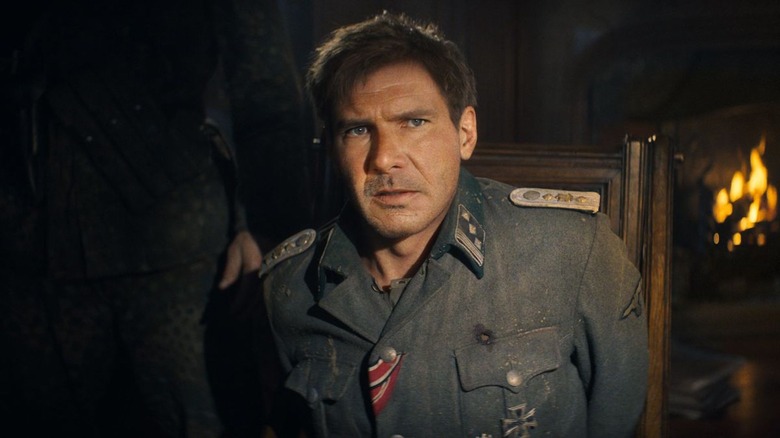Tom Hanks Wonders Whether Audiences Will Actually Care If Hollywood Uses A.I. Acting
During a recent appearance on BBC's "The Adam Buxton Podcast," Tom Hanks turned the conversation towards AI and deep fake technology, which the actor will utilize in the upcoming Robert Zemeckis film based on Richard McGuire's graphic novel "Here." The company executing this effect will be Metaphysic, the same team that gave us twenty-something Mark Hamill in "The Book of Boba Fett."
The typical touchstones were hit upon in that conversation, like the legal and ethical question of what can be done with an actor's voice and image beyond the usual dictates of storytelling and whether or not that extends after the actor passes away. Hanks said, "I could be hit by a bus tomorrow and that's it, but performances can go on and on and on and on." He didn't say that as a good thing, by the way, but something that should be considered as the topic of AI and deep fake integration into storytelling is debated.
Part of making movies and ongoing series is an agreement between the audience and filmmakers to suspend some degree of disbelief. You know Mark Ruffalo doesn't really turn into The Hulk when you're watching a Marvel movie, just as you know that Tom Cruise has a hair and makeup team seeing to him just before he throws himself off of a cliff.
The really interesting question Hanks throws out has nothing to do with the many ways that greedy studios can abuse AI tech because we all know they will (and there's a WGA strike currently going on right now to try to curb some of that down the line). What Hanks asks is a more important question: Yes, you're going to see a ton more deep fake and AI-enhanced characters in movies, but will audiences care?
Where is the line between ghoulish and cool?
That's the key question because if the audience is repulsed by AI actors in movies and the inevitable first AI-generated screenplay then this whole concern goes away. The studios care about money. All they do is chase success and that success is measured in the cost of the product versus how much it rakes in.
Tom Hanks comes to the conclusion that most of the audience will not care and I believe he's (mostly) right. Right now, deep fake is a tool to help tell stories in ways that make geeks lose their minds. De-aged Luke Skywalker in "The Mandalorian" and "The Book of Boba Fett" is a perfect example. As an extension of visual effects, the audience embraces these tools.
Where things start getting fuzzy is when these same tools are used to bring the dead back to roles that made them famous. You ask "Ghostbusters" fans what they thought of Harold Ramis' Egon Spengler being brought back for "Ghostbusters: Afterlife" and you'll get wildly varied responses. Some feel it was ghoulish, some thought it was a touching tribute to an old friend that was supported by and benefited his surviving family.
As the technology continues to grow and get better, you're going to see a lot more of this happening. This is why the guilds need to get rock-solid agreements in place before someone like Harrison Ford, for instance, who signed away his likeness rights to George Lucas almost 50 years ago, can now just be plopped into any random "Star Wars" property in realistic ways, speaking with AI-assisted voice replication, without Ford himself being involved for a single second.
Likeness as IP
I don't believe the tech is there yet, but it's already impressive in its infant state now and will only get harder and harder to spot as it gets more sophisticated. Right now, it's predominantly being used as an extension of practical and digital makeup, usually to trigger our nostalgia centers as we see the Indiana Jones and Luke Skywalkers of our childhoods, and I don't think most people have an issue with that.
But, as Tom Hanks posits, what will we think when we see 30-year-old Tom Hanks headlining a movie a decade after he passes? Will that be allowed? Should it be allowed? Will audiences find it ghoulish or just love to see and hear their favorite actor again?
Because that is where this is all going. Ownership of actors is old as the studio system itself. Back in the day, studio bosses would have exclusive contracts with their actors much like sports franchises today. The actors would have little to no say in what they would be in or if they'd be traded with another studio for an actor deemed to be of equal value.
We're on the cusp of studios owning actors like IPs and this debate will get much uglier before the dust settles. At the end of the day, it will be up to audiences to accept or reject a new reality in which we get our favorite actors looking photorealistic and sounding just like they did when they were young — but what they bring to the screen boils down to simple looks and sounds. For lack of a better term, there's something innately human, a soul, we respond to when we see Harrison Ford in top form that no computer can or ever will replicate.


